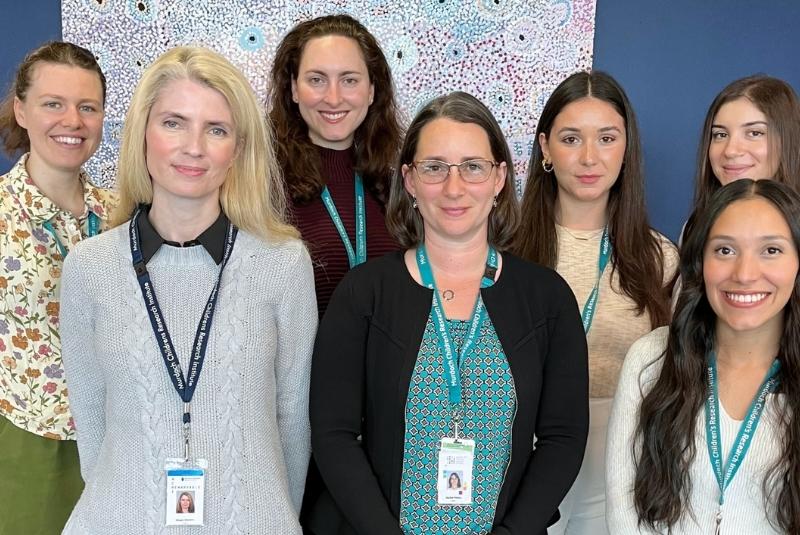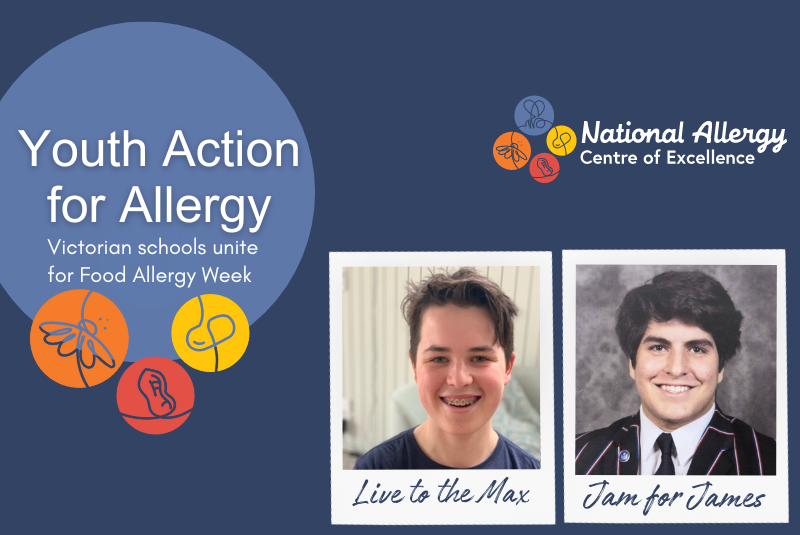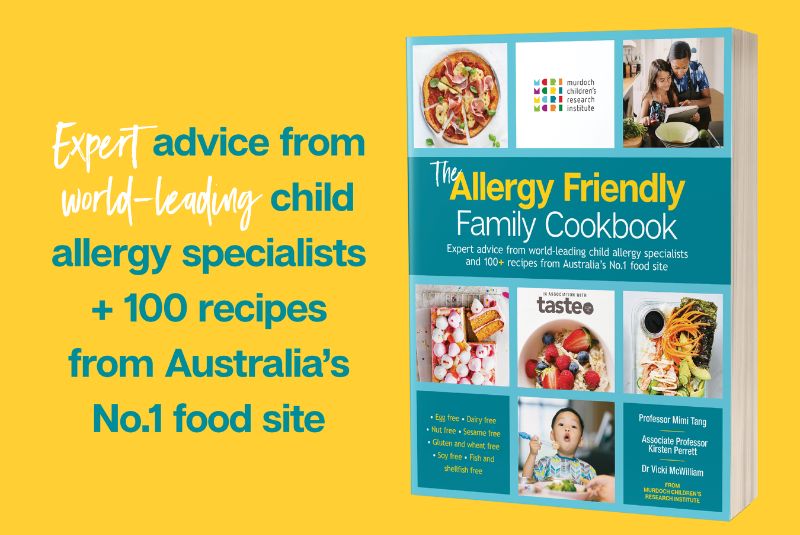Centre for Food and Allergy Research (CFAR)

We use the latest approaches in epidemiology, immunology, paediatrics, nutrition, gastroenterology and biostatistics to investigate factors that cause, prevent and improve food allergies.
The Centre for Food Allergy Research (CFAR) is an Australia-wide collaboration of food allergy experts.
CFAR supports Australia’s leading food allergy experts to help advance scientific knowledge about allergic disease.
The Centre for Food Allergy Research (CFAR) is an Australia-wide collaboration of food allergy experts.
CFAR supports Australia’s leading food allergy experts to help advance scientific knowledge about allergic disease.
The Centre for Food Allergy Research (CFAR) is an Australia-wide collaboration of food allergy experts.
CFAR supports Australia’s leading food allergy experts to help advance scientific knowledge about allergic disease.
About CFAR
CFAR is also recognised as a World Allergy Organization Centre of Excellence and is hosted at the Murdoch Children’s Research Institute in Melbourne, Australia. CFAR has helped Australia remain a global leader in this field through its work on novel food allergy research projects, translation of research outcomes into clinical practice, and training emerging food allergy researchers.
The National Health and Medical Research Council has funded CFAR as a Centre of Research Excellence since 2013.
Our vision
Our vision is to reduce the incidence and burden of food allergies and improve health outcomes through novel population and precision prevention, intervention and management strategies.
Our mission
Our mission is to further advance our progress on food allergy scientific and clinical innovation, rapid translation of evidence into public health policy and clinical practice changes, and education and mentorships of emerging food allergy researchers.
Why research food allergy?
The number of children with a food allergy or food-related immune disorder has soared in the last 10 years.
Food allergy affects:
- 10 percent of infants under 12 months old
- Five percent of children aged 10 to 14 years
- 2 to 4 percent of adults
Food allergies can be really uncomfortable and even life threatening.
While mild symptoms include hives and swelling, severe symptoms such as breathing difficulties (called anaphylaxis) can be life threatening. Food allergies also affect a person’s quality of life as they need to be really careful they don’t accidentally eat something that contains the food they’re allergic to.
Researchers don’t yet know why food allergies develop.
We know they run in families, but your family history or genetics is only part of the story. Non-genetic (or environmental) factors also play a part.
More information
Our people
CFAR Director
Professor Kirsten Perrett became Director in 2022 and led the team to secure a third consecutive round of NHMRC funding. CFAR3 will continue to build on the research program to help reduce the incidence of food allergies, investigate ways to prevent, treat and manage food allergies, rapidly transfer outcomes into public health policy and clinical practice changes, and train emerging food allergy researchers.
- Dr Jennifer Koplin - Former CFAR Director, 2018-2022, Epidemiologist, The University of Queensland
Our key researchers
- Professor Mimi Tang - Murdoch Children’s Research Institute
- Professor Dianne Campbell - Children's Hospital Westmead
- Professor Andreas Lopata - James Cook University
- Associate Professor Debbie Palmer - Telethon Kids Institute
- Professor Shyamali Dharmage - The University of Melbourne
- Professor Katherine Lee - Murdoch Children's Research Institute
- Professor Richard Saffery - Murdoch Children’s Research Institute
- Professor Kim Dalziel - The University of Melbourne
Find more information about Our People on CFAR website.
Our projects
HealthNuts
Childhood food allergy has become a major public health problem. The extremely rare but devastating consequences of sudden death magnify concern over the rapidly rising incidence of food allergy in a healthy child.
The HealthNuts study of 5,300 children is the world's first comprehensive population-based study of food allergy with the aim measurement of true food allergy.
It will enable us to better understand the natural history of allergic disorders, including food allergy, asthma, eczema and hay fever and the risk factors for developing these conditions in childhood. The study will have important implications for clinical guidelines and public health policy.
Age 4-year-old phase
As children turned four years of age, we asked parents to fill out a short questionnaire, and any HealthNuts children we'd seen previously or those who reported a new food allergy were invited to the RCH for further allergy testing.
Age 6-year-old phase
As children turned six years of age, we contacted parents to fill out a short questionnaire, and ALL HealthNuts children were invited to have a free allergy health check.
Age 10-year-old phase
As children turned ten years of age, parents were asked to fill out a short questionnaire, and ALL HealthNuts children were again invited to have a free allergy health check.
Age 15-year-old phase
Our participants are now turning 15 years old. We are excited to announce that we have funding to follow up children at 15 years of age.
SchoolNuts
Who's affected by allergies?
Allergic disease affects up to 40 percent of Australian children, and the incidence continues to rise at an alarming rate. Food allergy is a serious public health issue, emerging over the last 10 - 15 years as a 'second wave' of allergy epidemic.
It is unclear why this recent phenomenon of allergies has lagged decades behind the 'first wave' of asthma, hay fever and inhalant sensitization. Hospital admissions for anaphylaxis, the most severe form of food allergy, has trebled in the past 15 years.
This new generation appears less likely to outgrow food allergy with long-term implications for allergic disease burden into later life.
Allergies and asthma
Emerging evidence also suggests the IgE-mediated food allergy is a predictor not only for the development of asthma but also appears to increase the risk of poorly controlled asthma. The prevalence of asthma in Australia is among the highest in the world, affecting between 10% and 15% of children. This study aims to determine prevalence and associated risk for food allergy in school-aged children, assess impact of food allergy on risk of asthma and severity of asthmatic children and understand factors likely to modify control of both food allergy and asthma.
Barwon Infant Study (BIS)
This study examines the connection between health and development during early life and chronic diseases (including allergic ones).
EPIGEN
This study investigates how a woman’s diet during pregnancy affects the development of her child’s immune system and the risk of developing allergic diseases such as food allergy and eczema.
Melbourne Atopic Cohort Study (MACS)
This study followed children with a family history of allergic disease from birth until 18 years to identify things that increase or decrease the risk of an allergic disease developing.
Vitamin D in Allergy trial (VITAL)
This trial tests what impact a vitamin D supplement given in the first six months of life has on the immune system of children who have a family history of allergic disease.
Questioning the role of Egg in lactation for induction of Specific Tolerance (QuEST)
This trial will test whether the number of eggs a woman eats during pregnancy affects the amount of egg protein in the blood she shares with her baby or in her breast milk after birth.
DOMInO - Docosahexaenoic acid to Optimise Mother Infant Outcome (Allergy Follow-up)
This trial tests whether taking fish oil capsules high in omega 3 during pregnancy helps protect babies from developing an allergic disease.
PPOIT - The Probiotic and Peanut Oral Immunotherapy trial
This trial tests whether a treatment plan involving both probiotics and peanut oral immunotherapy (PPOIT) can help build a tolerance to peanuts in children who are allergic to them.
BEAT - Beating Egg Allergy Trial
This trial tests whether eating egg for the first time at a younger age (between four and six months of age) can help prevent egg allergy in babies at high risk of allergic disease.
CAKE
This trial tests whether eating baked egg regularly helps children who are allergic to raw egg to ‘outgrow’ or build up a tolerance to it.
4-FEED Trial
This trial tests whether avoiding cow’s milk, eggs, wheat and soy is an effective treatment for children with eosinophilic oesophagitis – a condition where the tube connecting the mouth and stomach becomes swollen and painful.
Solids Timing for Allergy Reduction (STAR)
This trial tests whether eating eggs at a younger age helps prevent infants with moderate-to-severe eczema (and accordingly a higher risk of food allergy) from becoming allergic to eggs.
STEP - Starting Time for Egg Protein
This study tests whether eating egg for the first time at a younger age (six months instead of 10 months) may help prevent egg allergy.
PEBBLES
To determine if routine application of an emollient to the skin of infants in early life prevents the development of eczema and food allergy and to investigate if this form of intervention is effective in children with a genetic predisposition (filaggrin null mutation) for having a poor skin barrier and increased risk of developing eczema.
Vitality Trial
This trial examines whether vitamin D supplementation given in the first 12 months of life can prevent the development of food allergy and reduce lower respiratory infections.
Funding
HealthNuts research
- National Health & Medical Research Council
- Ilhan Food Allergy Foundation
- AnaphylaxiStop
- Australian Egg Corporation Pty.
- ALK Abello, S.A. Madrid, España
- US Department of Defense
- The Kimberley Foundation
Collaborations
- Murdoch Children's Research Institute
- University of Melbourne
- University of Western Australia
- Royal Children’s Hospital, Melbourne
- Women’s & Children’s Health Research Institute
- University of Adelaide
- Children’s Hospital at Westmead, Sydney
- Child and Adolescent Health Service, Dept. of Health, Government of Western Australia
- Griffith University
- Children’s Health Queensland
- University of Queensland
- Sydney Children’s Hospital, Randwick
- James Cook University
CFAR board appointments, committees and memberships
- 3-generation study of asthma: International Consortium
- Allergy and Immunology Foundation of Australasia
- American Academy of Allergy
- American Academy of Allergy, Asthma and Immunology (AAAAI)
- Anaphylaxis Australia Medical Advisory
- Asia Pacific Immunoglobulins in Immunology Expert Group
- Australasian Society of Clinical Immunology and Allergy (ASCIA)
- Australian Eosinophilic Oesophagitis support group
- British Paediatric Allergy, Immunity and Infection Group
- European Community Respiratory Health Survey
- European Society of Paediatric Gastroenterology, Hepatology and Nutrition
- Food Allergy and Anaphylaxis Network (FAAN)
- Food Standards Australia New Zealand (FSANZ)
- Ilhan Food Allergy Foundation
- Integrated Approaches to Food Allergen and Allergy Risk Management (iFAAM)
- International Inflammation ‘In-FLAME’ network
- International Union of Immunological Societies
- Nestle Scientific Advisory Board
- NSW Ministry of Health, Department of Education
- Nutricia Medical Advisory Board
- Raising Children Network board
- Royal Australasian College of Physicians (RACP)
- Royal Statistical Society
- Statistical Society of Australia (Incorporated)
- Thoracic Society of Australia and New Zealand
- TVW Telethon Kids Institute
- Victorian Department of Education & Early Childhood Development
- Victorian Department of Health: Anaphylaxis Advisory Group
- World Allergy Organization
Contact us
Centre for Food and Allergy Research (CFAR)
Murdoch Children's Research Institute
The Royal Children's Hospital
50 Flemington Road
Parkville VIC 3052
Australia
Email: show email address












